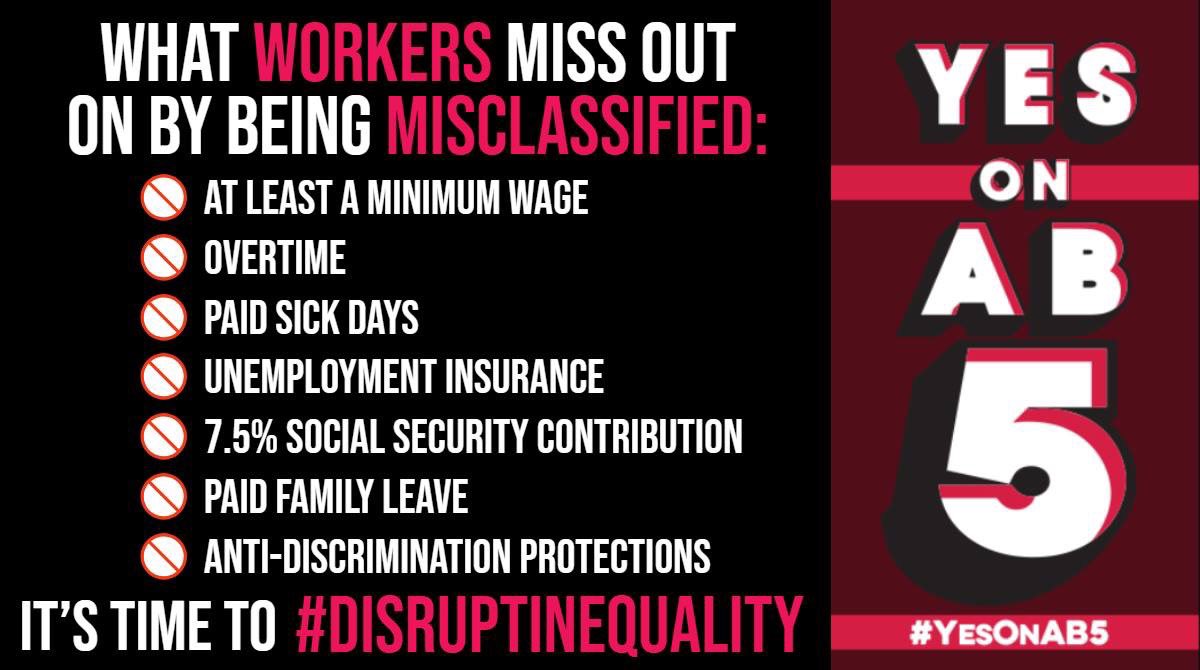 There are two bills in the California Legislature this session which are intended to elevate the status of the gig worker, usually someone who works as an independent contractor and receives work by means of a mobile app. One is AB 71 (Melendez and Kiley). The other which this blog will be about is AB 5 (Gonzalez).
There are two bills in the California Legislature this session which are intended to elevate the status of the gig worker, usually someone who works as an independent contractor and receives work by means of a mobile app. One is AB 71 (Melendez and Kiley). The other which this blog will be about is AB 5 (Gonzalez).The bill is either brand new or is running into headwinds at the moment. It would take someone in Sacramento who knew the right questions to ask about the legislation to make the determination between either of those characterizations. The following about the bill is clear today:
- there are no co-authors
- it has not been assigned to a committee for review
- it is very brief
- there have been no modifications to it since it's first reading 91 calendar days ago
In essence, the bill is meant to put a court decision into law
Dynamex Operations West, Inc. v. Superior Court of Los Angeles (2018) 4 Cal.5th 903 has many implications for companies that hire independent contractors - specifically gig workers. It has three tests that reclassify those who were independent contractors as employees:
(A) that the worker is free from the control and direction of the hiring entity in connection with the performance of the work, both under the contract for the performance of the work and in fact;
(B) that the worker performs work that is outside the usual course of the hiring entity’s business; and
(C) that the worker is customarily engaged in an independently established trade, occupation, or business of the same nature as the work performed.
Lyft, Uber, DoorDash and many other services all fall under that description.
One analysis of the B and C tests illustrates that there is a lot to clear up about compensation (wage or salary):
For example, prong B of the ABC test is particularly troublesome for any businesses that use independent contractors to deliver or provide their core product or service. In applying the ABC test to Dynamex, the Court noted that a class of delivery drivers could be certified under prong B because the question of whether the delivery drivers were performing outside the usual course of Dynamex’s business could clearly be resolved on a classwide basis. Indeed, delivery services—which are provided by the delivery drivers—are the very core of Dynamex’s business.
Lastly, it is not yet clear whether the ABC test applies to wage claims that do not arise from a wage order. For example, a claim for reimbursement for business expenses such as fuel and tolls that are not governed by a wage order and are obtainable only under section 2802 of the Labor Code may still be controlled by the Borello test. Indeed, this was the holding of the Court of Appeal in Dynamex, and the Supreme Court stated that it was not reaching the issue. Also left open by the Supreme Court’s decision is whether the “exercises control over the wages, hours or working conditions” prong of the wage orders’ definition of “employ” is applicable to classification questions outside the joint employment context.
Current language in legislation AB 71 could clear that up.